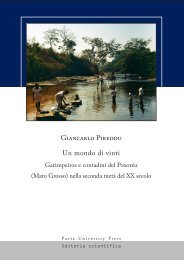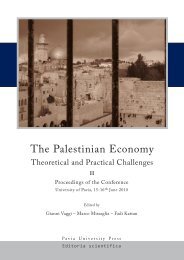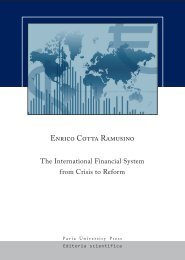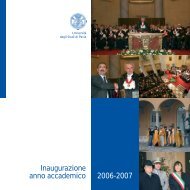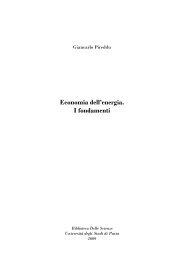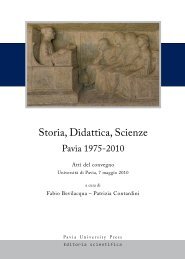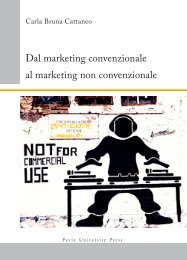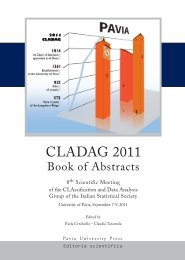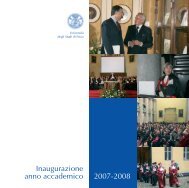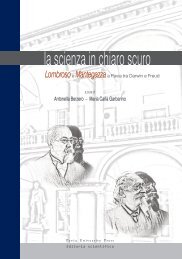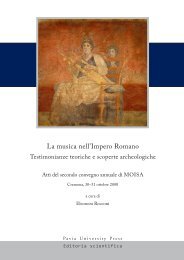Musica che affronta il silenzio - Scritti su Toru Takemitsu - Pavia ...
Musica che affronta il silenzio - Scritti su Toru Takemitsu - Pavia ...
Musica che affronta il silenzio - Scritti su Toru Takemitsu - Pavia ...
Create successful ePaper yourself
Turn your PDF publications into a flip-book with our unique Google optimized e-Paper software.
108<br />
Gianmario Borio<br />
2. the reciprocal interest of Western and Eastern composers has been only minimally<br />
conditioned by economic or ideological factors; in fact the convergence<br />
of interests and objectives seems motivated exclusively by the wish to enlarge<br />
the respective areas of experience and renew forms of expression.<br />
It must however be borne in mind that the starting-points for Euro-American and for<br />
Asiatic composers are not symmetrical. The former turn to extra-European musical<br />
traditions to find solutions or confirmation for is<strong>su</strong>es (concerning the organization of<br />
pit<strong>che</strong>s, rhythm, timbre, means of instrumental performance and vocal emission) which<br />
have emerged in the elaboration of their own techniques and theorising. Whereas the<br />
latter, through fam<strong>il</strong>iarisation with new techniques and contact with the conceptual<br />
world of their Western colleagues, acquire the means to perfect their own styles and<br />
reach a much wider circle of listeners than is possible in their homeland. From the end<br />
of the Second World War to the present, the musical language has undergone a continuous<br />
and inexorable internationalisation; indeed, precisely the tendency to go beyond<br />
the national sphere – a tendency which forms part of the avant-garde’s DNA – determined<br />
a diversification of styles and an aesthetic freedom which came into conflict with<br />
the unitarian attitude of the avant-garde itself.<br />
The reciprocal convergence – which became more and more apparent as the styles<br />
of composition and technological applications spread globally – had an irregular<br />
development and was linked to the individual evolution of composers. I shall restrict<br />
myself to a few examples, concentrating on the two decades that came after the Second<br />
World War as manifesting a process in which Tru Takemit<strong>su</strong> played a major role. I<br />
can begin from the “East-West Music Encounter Conference” held in Tokyo from 17 to<br />
22 Apr<strong>il</strong> 1961. This event had many interesting features: the general secretary, and<br />
prime mover, was Nicolas Nabokov, who held a prominent position in the Congress for<br />
Cultural Freedom, one of the organizations through which the CIA sponsored the<br />
dissemination of Western culture and politics worldwide. In spite of its more or less<br />
overt propaganda intent, the Tokyo Conference was the forum for an open and fruitful<br />
discussion which fostered exchanges between Western and Eastern musicians. The<br />
panel of speakers were particularly well chosen, bringing together not only people from<br />
many different countries but also the various professional figures in music (composers,<br />
performers, critics, musicologists and ethnomusicologists); even today most of the<br />
topics on the agenda (‘Renewing the musical language’, ‘Music education’, ‘Patronage<br />
of music’, ‘Music and society’) play a primary function in the on-going exchange<br />
between the two hemispheres. 2<br />
2 Cf. Music – East and West (1961). The Western composers who addressed the Conference were Elliott Carter,<br />
Henry Cowell, Lou Harrison, Colin McPhee, Virg<strong>il</strong> Thomson and Iannis Xenakis; among musicologists we can<br />
recall in particular Alain Danielou, Robert Garfias, Mantle Hood, Leo Schrade and Hans Heinz Stuckenschmidt.



